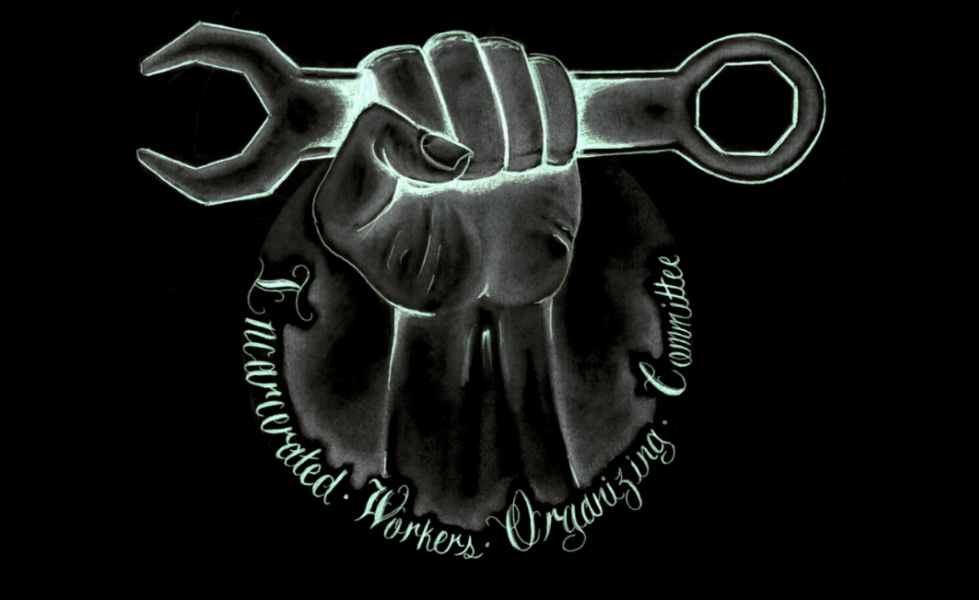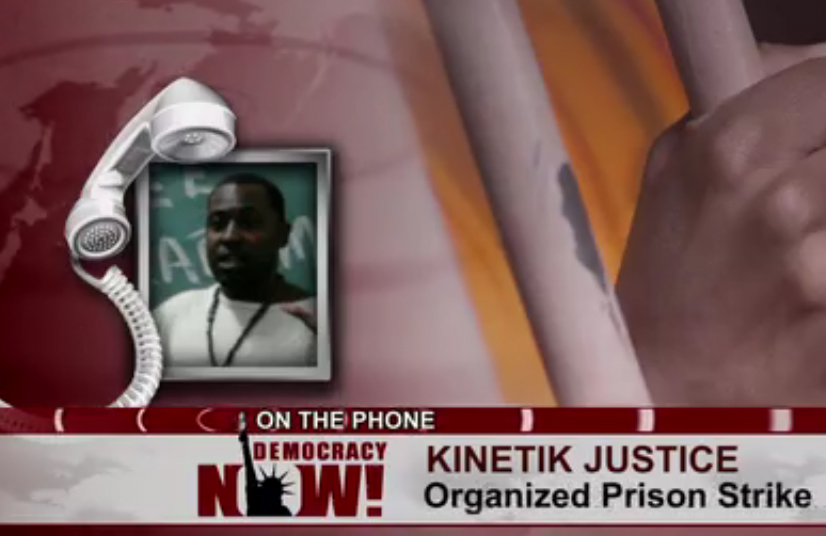In late March, a prisoner named Johnny Lee Spears was stabbed to death at Alabama’s Elmore Correctional Facility. Soon after, his fellow inmates began plotting a protest. Many believed that Spears died because he did not receive proper medical care after the attack, and the incident — combined with longstanding complaints against the state’s prison system about overcrowding, frequent acts of violence, crumbling facilities, and medical neglect — was like dropping a match in a keg of gunpowder.
Weeks earlier, similar gripes at the Holman Correctional Facility, another Alabama prison that houses inmates on death row, prompted a riot that saw prisoners seize control of their cell blocks, stab a guard and the warden, and set several fires. This time, the inmates at Elmore wanted their grievances addressed through nonviolent means.
The Elmore prisoners reached out to Melvin Ray, an inmate at the state’s St. Clair Correctional Facility and the founder of the Free Alabama Movement, a prisoner-organized human rights group. Ray told them he could help organize a work stoppage. Dozens of Alabama inmates possess contraband cellphones — some told VICE News they bought the phones illegally from guards — and on April 30 they received a text message.
“We will no longer voluntarily participate in this slave system where economics are placed over our humanity,” the message read. “All [that] is required is for industry workers, kitchen workers, and hall runners to sit down.”
Related: Whole Foods, Expensive Cheese, and the Dilemma of Cheap Prison Labor
On May 1, when protesters around the world marched for workers’ rights on May Day, inmates throughout the Alabama prison system went on strike. Prisoners refused to show up to their assigned jobs, where they are paid a maximum of 30 cents per hour to manufacture license plates, serve food, and clean. One Alabama prison has an inmate-staffed recycling plant, and another has a farm where prisoners grow and harvest all of the crops.
“Prison systems could not operate without exploiting prison labor; prisoners cook the meals, do the laundry, provide maintenance work, cut the grass, work as clerks and teachers’ aides, and much more,” said Alex Friedmann, associate director of the Human Rights Defense Center, a nonprofit that publishes Prison Legal News. “Without the use of low-cost or free prisoner labor, our prison system would grind to a halt — and prisoners are increasingly coming to that realization.”
‘Without the use of low-cost or free prisoner labor, our prison system would grind to a halt — and prisoners are increasingly coming to that realization.’
The strike included at least 300 prisoners at Elmore alone, according to the Alabama Department of Corrections (ADOC) spokesman Bob Horton. The facility was placed on lockdown, meaning prisoners could not leave their cells or dorms, but the restrictions were lifted on Tuesday after about 90 percent of the prisoners returned to work.
Holman remains on lockdown because of the strike, and prisoners told VICE News that the work stoppage has also spread to the Staton Correctional Facility, a medium-security prison that houses around 1,300 inmates, and to St. Clair, which was also placed on partial lockdown last week.
“The main reason that we’re striking is because there continues to be problems inside of the prison and the state’s focus is not on solving the problems — it’s on finding new ways to make money,” said Ray. “They’re not affording us the opportunity to make our concerns known. They’re not listening to our complaints. The only way we have to get their attention is to do these shut downs.”
Related: Hard Labor: Here’s the Weird Shit Inmates Can Do for Work in US Prisons
The strike in Alabama began exactly one month after a similar inmate action in Texas, where prisoners demanded that the state put an end to “prison slavery,” reform parole guidelines, and eliminate a mandatory $100 co-pay for medical care. The Texas strike ended without the state meeting any of the demands.
The Alabama prisoners have also been coordinating with inmates in Mississippi and Virginia to call for a nationwide prisoner work stoppage on September 9, 2016. The day marks the 45th anniversary of the Attica Prison riot, a landmark moment in the prisoners’ rights movement where more than 1,000 inmates at the notorious New York lockup seized control of the facility and demanded political rights and better living conditions.
‘We will no longer voluntarily participate in this slave system where economics are placed over our humanity.’
The major grievance in Alabama is overcrowding. The state’s prisons are holding nearly three times as many people as they were originally intended to house, according to the latest ADOC statistics. A lawsuit filed in 2014 by the Equal Justice Initiative, a nonprofit that litigates on behalf of indigent inmates, blamed the overcrowding problem for high levels of violence across the state prison system. Seven people were killed while in ADOC custody last year.
On May 7, the striking prisoners emailed a list of demands to the media that included abolishing sentences of life without parole for first-time offenders, and repealing the Habitual Felony Offender Act, Alabama’s version of the “three-strikes law,” which has led to life sentences for some repeat offenders convicted of drug charges and other low-level, nonviolent offenses. Other demands include implementing education, rehabilitation, and reentry programs, expanding the Alabama Innocence Inquiry Commission, which works to exonerate wrongfully convicted individuals, and ending “prison slavery.”
Attempts by Alabama lawmakers to address overcrowding and other issues have either stalled or proceeded slowly. Governor Robert Bentley signed a prison reform bill into law last year that is expected to cut the prison population by at least 4,200 people, bringing the prison population down to about 150 percent over capacity.
Footage from the inmate riot at Alabama’s Holman Correctional Facility on March 11.
The situation in Alabama’s prisons was largely overlooked until the riot at Holman on March 11. The incident attracted national media attention after inmates used their contraband cellphones to post footage of the uprising on Facebook. Bentley used the riot to push state legislators to approve a bill that would borrow $800 million from the state’s educational fund to build four new “mega-prisons,” which would have room for far more prisoners than the current facilities.
Prisoners who spoke with VICE News argued that the new “mega-prisons” wouldn’t solve the state’s problems or even alleviate overcrowding. They argued that instead of building new facilities, the state needs to reform its harsh sentencing laws.
Related: These Inmates Won $85,000 Because Their Prison Is on Lockdown Too Often
“They were going to build a new $800 million prison complex in the state of Alabama. For us on the inside, we know that’s really an $800 million corporation,” Ray said. “We view prison labor as real slavery.”
Multiple prisoners at Holman claimed that guards have retaliated for the strike by reducing the amount of food served at each meal. Inmates provided VICE News with photos that appeared to show paltry meals, including one that consisted of two small hot dogs, a slice of bread, and corn, and another that was just beans and two cupcakes. Typically, inmates who work in the prison kitchen prepare and serve meals, but correctional officers have assumed those duties during the strike.

Prisoners in Alabama claim guards have retaliated for a work stoppage by withholding food. One inmate sent VICE News this photo of a recent meal he was served. (Photo via Raven Rakia/VICE News)
Horton did not directly comment on the allegation that guards are withholding food to punish inmates for the strike. However, in a previous statement, he said, “Correctional staff are responding by delivering the basic services to all inmates at both facilities. The facilities are secure, inmates are receiving their daily meals, and their healthcare needs are being met.”
VICE News spoke with one 40-year-old prisoner with diabetes who claimed that the food situation at Homan has put him and other diabetic inmates at risk. Diabetic prisoners are usually offered a special menu with items that help them avoid hypoglycemia, a sometimes fatal condition caused by dangerously low blood-sugar levels.
Related: Alabama’s Governor Used Oil Spill Funds to Renovate His Coastal Mansion
“We’re supposed to get a minimum 2,400 calories a day and a minimum of 125 grams of protein a day and the meals that they’ve been feeding us are not adequate enough to keep our blood sugar up enough to take our insulin,” said the inmate, who requested anonymity for fear of retaliation from guards and prison officials.
A lawsuit filed by Southern Poverty Law Center (SPLC) in June, 2014 alleged that medical neglect is rampant in Alabama prisons due to inadequate medical staffing. In 2014, according to the SPLC, the ratio of medical staff to prisoners was 1 to 51 in 2014, resulting in “delays, failures to diagnose and treat problems, failure to follow up with patients, errors and decisions to not treat seriously ill prisoners.”
Ray said the strike at Holman is expected to last through the end of the month, but the prisoners will keep pushing for reform even after it ends.
“We’re not going to stop fighting back against the system… until these walls come down,” he said.
Follow Raven Rakia on Twitter:



 Originally posted to
Originally posted to 
 From -Fight Toxic Prisons
From -Fight Toxic Prisons From
From 